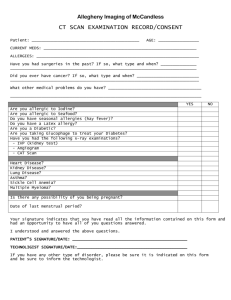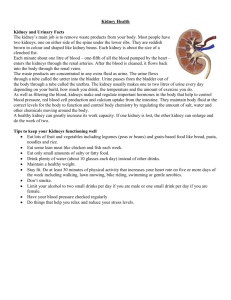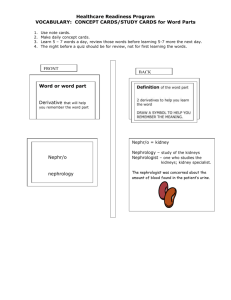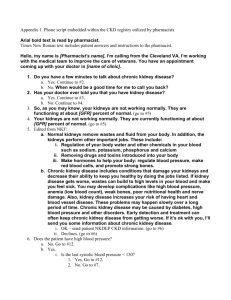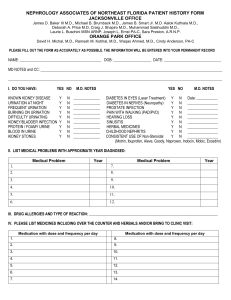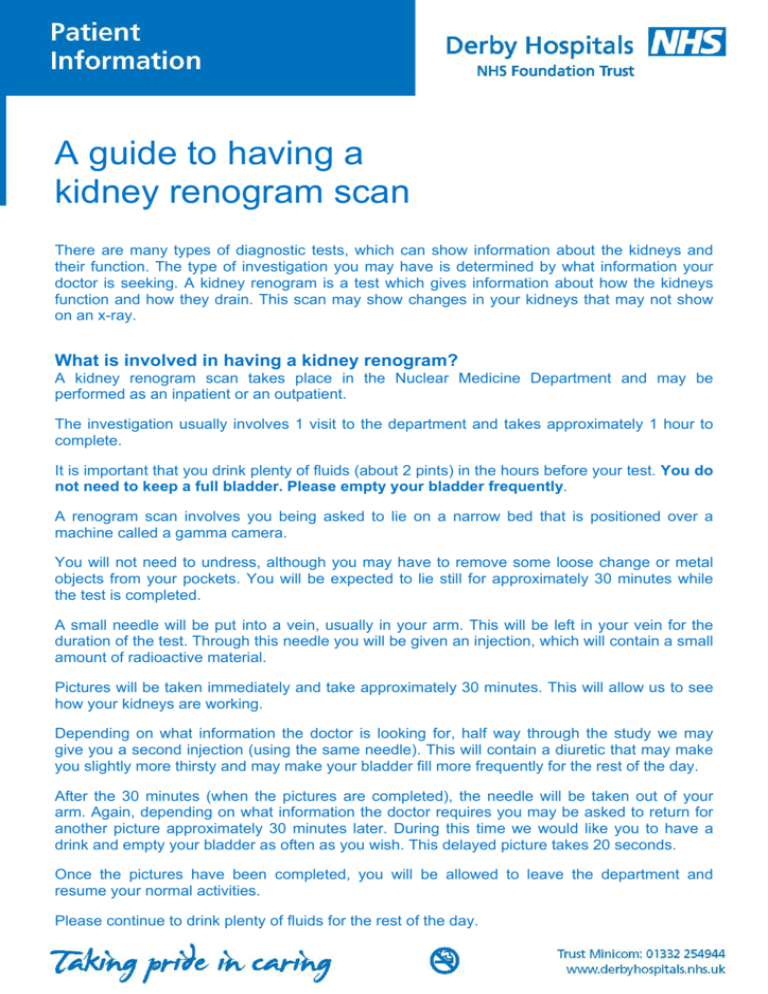
A guide to having a
kidney renogram scan
There are many types of diagnostic tests, which can show information about the kidneys and
their function. The type of investigation you may have is determined by what information your
doctor is seeking. A kidney renogram is a test which gives information about how the kidneys
function and how they drain. This scan may show changes in your kidneys that may not show
on an x-ray.
What is involved in having a kidney renogram?
A kidney renogram scan takes place in the Nuclear Medicine Department and may be
performed as an inpatient or an outpatient.
The investigation usually involves 1 visit to the department and takes approximately 1 hour to
complete.
It is important that you drink plenty of fluids (about 2 pints) in the hours before your test. You do
not need to keep a full bladder. Please empty your bladder frequently.
A renogram scan involves you being asked to lie on a narrow bed that is positioned over a
machine called a gamma camera.
You will not need to undress, although you may have to remove some loose change or metal
objects from your pockets. You will be expected to lie still for approximately 30 minutes while
the test is completed.
A small needle will be put into a vein, usually in your arm. This will be left in your vein for the
duration of the test. Through this needle you will be given an injection, which will contain a small
amount of radioactive material.
Pictures will be taken immediately and take approximately 30 minutes. This will allow us to see
how your kidneys are working.
Depending on what information the doctor is looking for, half way through the study we may
give you a second injection (using the same needle). This will contain a diuretic that may make
you slightly more thirsty and may make your bladder fill more frequently for the rest of the day.
After the 30 minutes (when the pictures are completed), the needle will be taken out of your
arm. Again, depending on what information the doctor requires you may be asked to return for
another picture approximately 30 minutes later. During this time we would like you to have a
drink and empty your bladder as often as you wish. This delayed picture takes 20 seconds.
Once the pictures have been completed, you will be allowed to leave the department and
resume your normal activities.
Please continue to drink plenty of fluids for the rest of the day.
When will I know the results?
Not straight away. A doctor who specialises in reading these pictures needs to study them in
detail. A report will be sent to the doctor who asked for this test and you will get the results
when you see your doctor at your next outpatient appointment.
Are there any risks involved in having a kidney renogram scan?
A kidney renogram is one of the most common nuclear medicine studies undertaken. Adverse
reactions during this procedure are rare. Occasionally, you may develop a rash around the
injection site or you may feel dizzy or flushed. These reactions have in all cases been shortlived. If you are concerned, please seek medical advice.
Radiation risks
This scan involves using radioactive materials and possibly x-rays, and so has the usual risks
associated with ionising radiation. The amount of radiation used is roughly equivalent to that
which you receive from natural background radiation in about 6 months. This adds very slightly
to the risk of, for example, developing a cancer. However, as one in three of us will develop a
cancer at some stage during our lives, the added risk is very small. Indeed, the risks from
missing a serious disorder by not having the scan are considerably greater.
Female patients who are or might be pregnant, or who are breastfeeding, must inform a
member of staff before the procedure.
If possible, please avoid close and prolonged contact with pregnant mothers, babies and
children for a few hours after the procedure. This helps to avoid exposing them to any
unnecessary radiation. The possible radiation dose to them is very small, but it is sensible to
reduce this to a minimum.
Are there any alternative treatment options?
Your consultant has recommended this procedure/treatment as being the best option. There are
no alternative procedures available. However, there is always the option of not receiving any
treatment at all.
The consequences of not having this investigation are that your consultant may not have a full
understanding of the cause of your symptoms and hence may not be able to offer you the best
appropriate management. If you would like more information please speak to your consultant or
a member of staff caring for you
References
British Nuclear Medicine Society: Dynamic Renal Radionuclide Studies - available at
http://www.bnms.org.uk/bnms-clinical/dynamic-renal-radionuclide-studies.html (last accessed June 2010)
If you have any or queries, or require further information
please contact the Nuclear Medicine Department,
Royal Derby Hospital on 01332 788197.
NHS Direct is a 24 hour nurse led, confidential service providing
general health care advice and information.
Telephone 0845 4647 or visit the website at www.nhsdirect.nhs.uk
Any external organisations and websites included here do not necessarily reflect the views of the Derby Hospitals NHS
Foundation Trust, nor does their inclusion constitute a recommendation.
Reference Code: P0653/0303/11.2010/VERSION4
© Copyright 2010 All rights reserved. No part of this publication may be reproduced in any form or by any means without prior
permission in writing from the Patient Information Service, Derby Hospitals NHS Foundation Trust. (G10413/12.2006/V3)


